Related Research Articles
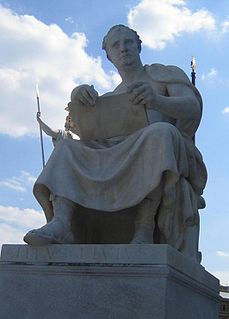
Titus Livius, known in English as Livy, was a Roman historian. He wrote a monumental history of Rome and the Roman people, titled Ab Urbe Condita, ''From the Founding of the City'', covering the period from the earliest legends of Rome before the traditional founding in 753 BC through the reign of Augustus in Livy's own lifetime. He was on familiar terms with members of the Julio-Claudian dynasty and a friend of Augustus, whose young grandnephew, the future emperor Claudius, he exhorted to take up the writing of history.
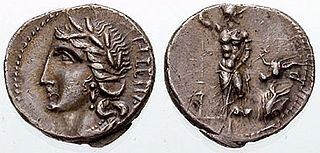
Marsi is the Latin exonym for an Italic people of ancient Italy, whose chief centre was Marruvium, on the eastern shore of Lake Fucinus. The area in which they lived is now called Marsica. During the Roman Republic, the people of the region spoke a language now termed Marsian in scholarly English. It is attested by several inscriptions and a few glosses. The LINGUIST List classifies it as one of the Umbrian Group of languages.

The province of Chieti is a province in the Abruzzo region of Italy. Its provincial capital is the city Chieti, which has a population of 50,770 inhabitants. The province has a total population of 387,649 inhabitants as of 2017 and spans an area of 2,599.58 square kilometres (1,003.70 sq mi). It is divided into 104 comuni (comune) and the provincial president is Mario Pupillo.

Ortona is a coastal town and municipality of the Province of Chieti in the Italian region of Abruzzo, with some 23,000 inhabitants.

The Battle of Ortona was a battle fought between two battalions of elite German Fallschirmjäger (paratroops) from the German 1st Parachute Division under Generalleutnant Richard Heidrich, and assaulting Canadian troops from the Canadian 1st Infantry Division under Major General Chris Vokes. It was the culmination of the fighting on the Adriatic front in Italy during "Bloody December". The battle was known to those who fought it as the "Italian Stalingrad," for the brutality of its close-quarters combat, which was only worsened by the chaotic rubble of the town and the many booby traps used by both sides. The battle took place in the small Adriatic Sea town of Ortona (Abruzzo), with a peacetime population of 10,000.

The book History of Rome, sometimes referred to as Ab Urbe Condita Libri, is a monumental history of ancient Rome, written in Latin between 27 and 9 BC by the historian Titus Livius, or "Livy", as he is usually known in English. The work covers the period from the legends concerning the arrival of Aeneas and the refugees from the fall of Troy, to the city's founding in 753, the expulsion of the Kings in 509, and down to Livy's own time, during the reign of the emperor Augustus. The last event covered by Livy is the death of Drusus in 9 BC. 35 of 142 books, about 25% of the work, are still extant. The surviving books deal with the events down to 293 BC, and from 219 to 166 BC.
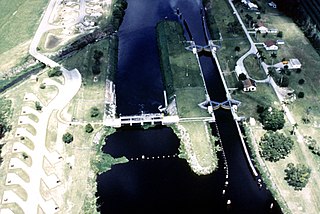
The Okeechobee Waterway or Okeechobee Canal is a relatively shallow artificial waterway in the United States, stretching across Florida from Fort Myers on the west coast to Stuart on Florida's east coast. The waterway can support tows such as barges or private vessels up to 50 feet wide x 250 feet long which draw less than 10 feet, as parts of the system, especially the locks may have low water depths of just ten feet. The system of channels runs through Lake Okeechobee and consists of the Caloosahatchee River to the west of the lake and the St. Lucie Canal east of the lake.

The Frentani were an Italic tribe occupying the tract on the southeast coast of the peninsula from the Apennines to the Adriatic, and from the frontiers of Apulia to those of the Marrucini. They were bounded on the west by the Samnites, with whom they were closely connected, and from whom they were originally descended. Hence Scylax assigns the whole of this line of coast, from the frontiers of Apulia to those of Picenum, to the Samnites. Their exact limits are less clearly defined, and there is considerable discrepancy in the statements of ancient geographers: Larinum, with its territory, being by some writers termed a city of the Frentani, while the more general opinion included it in Apulia, and thus made the river Tifernus (Biferno) the limit of the two countries. The northern boundary of the Frentani is equally uncertain; both Strabo and Ptolemy concur in fixing it at the river Sagrus, while Pliny extends their limits as far as the Aternus, and, according to Mela, they possessed the mouths both of that river and the Matrinus. The latter statement is certainly inaccurate; and Strabo distinctly tells us that the Marrucini held the right bank of the Aternus down to its mouth, while the Vestini possessed the left bank; hence, the former people must have intervened between the Frentani and the mouth of the Aternus. Pliny's account is, however, nearer the truth than that of Strabo and Ptolemy; for it is certain that Ortona and Anxanum, both of which are situated considerably to the north of the Sagrus, were Frentanian cities. The latter is indeed assigned by Ptolemy to that people, while Strabo also terms Ortona the port or naval station of the Frentani, but erroneously places it to the south of the river Sagrus. Hence, their confines must have approached within a few miles of the Aternus, though without actually abutting upon that river. On the west, they were probably not separated from the Samnites by any well-marked natural boundary, but occupied the lower slopes of the Apennines as well as the hilly country extending from thence to the sea, while the more lofty and central ridges of the mountains were included in Samnium.

San Vito Chietino is a town and comune in the province of Chieti in the Abruzzo region of central Italy.

Ortona dei Marsi is a comune and town in the province of L'Aquila in the Abruzzo region of central Italy. It is included in traditional area of Marsica. The commune is part of the National Park of Abruzzo, Lazio and Molise. Ortona dei Marsi is situated on 1000 meters above sea level and the mountains that surround the valley reach up to 1,800 meters.
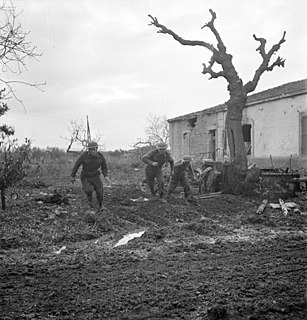
The Moro River Campaign was an important battle of the Italian Campaign during the Second World War, fought between elements of the British Eighth Army and LXXVI Panzer Corps of the German 10th Army. Lasting from 4 December 1943 to 4 January 1944, the campaign occurred primarily in the vicinity of the Moro River in eastern Italy. The campaign was designed as part of an offensive launched by General Sir Harold Alexander's Allied 15th Army Group, with the intention of breaching the German Army's Winter Line defensive system and advancing to Pescara—and eventually Rome.

The Italian Catholic Archdiocese of Lanciano-Ortona has existed under this name since 1986. It is a suffragan of the Archdiocese of Chieti-Vasto. The historical Diocese of Lanciano was created in 1515. It was united with the Diocese of Ortona in the nineteenth century.
Caeso Fabius Vibulanus was consul of the Roman republic in 484, 481, and 479 BC. He had earlier held the office of quaestor parricidii in 485 BC in connection with the trial and execution of Spurius Cassius Vecellinus.

Giacomo Perez-Dortona or d'Ortona is a retired French competitive swimmer belonging to club CN Marseille. At the 2012 Summer Olympics, he competed in the men's 100 metre breaststroke, finishing in 17th place in the heats, failing to reach the semifinals. He was also part of the French men's 4 x 100 m medley relay team.
The Roman-Aequian wars were a series of wars during the early expansion of ancient Rome in central Italy against their eastern neighbours, the Aequi.
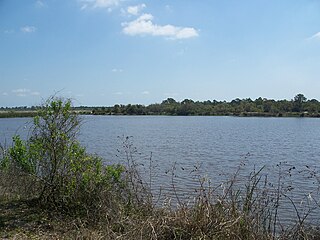
Ortona is an unincorporated area and a populated place in Glades County, Florida.
Gaius Julius Iullus was a Roman statesman, who held the consulship in 482 BC. After a contentious election, he was chosen to represent the more moderate faction in Roman politics, while his colleague, Quintus Fabius Vibulanus, was elected by the aristocratic party. Both consuls led a Roman army against Veii, but withdrew when the Veientes refused to confront them. Thirty years later, in 451, Julius was chosen a member of the first decemvirate, alongside several other ex-consuls and other respected statesmen. Julius proved himself a man of good judgment and integrity, and helped to draw up the first ten tables of Roman law.

Ortona Lighthouse is an active lighthouse located in Ortona on the Adriatic Sea.
References
- Livy, Ab urbe condita , 2:43
| Wikimedia Commons has media related to Ortona, Latium . |